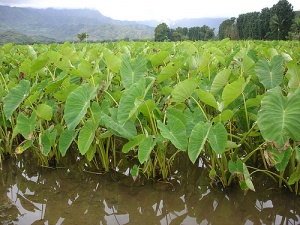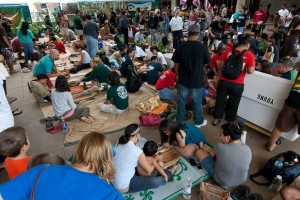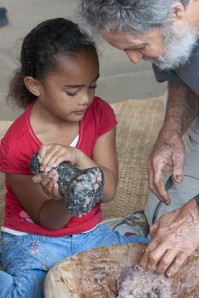Blog
News, updates, finds, stories, and tidbits from staff and community members at KAHEA. Got something to share? Email us at: kahea-alliance@hawaii.rr.com.
Open Ocean Aquaculture proves itself very controversial in on-going newspaper commentary
From Alana:
For the past few weeks there have been numerous articles, editorials, and letters to editors in several local newspapers regarding open ocean aquaculture. A recent editorial in the Honolulu Advertiser states that
the large size and experimental nature of the [Hawaii Oceanic Tech] project demands that state regulators, and the public, keep a critical eye on the project as it moves forward.
The article goes on to say that the objective of this project is an organic, ecologically sustainable fish.
PROBLEM #1: Organic. The problem with this is that there are no organic standards for fish farming. It would also be especially hard to develop one for open ocean aquaculture, because the cages are not closed systems. Anything that is in the water will wind up in the bodies of the fish.
Hawaii Oceanic Tech also hopes to use “organic feed” for their fish. The main ingredient in HOTIs feed will be “sardines from sustainable fish stocks”. But, this goes back to what I said above: there are no organic standards for fish, so any claims of their feed being so are false.
PROBLEM #2: Ecologically Sustainable. This is a tricky one, just because it is so undefined. What is ecologically sustainable? Everything humanity does will impact the environment in some way. Perhaps ecologically sustainable means there is a balance of pros and cons for the environment. But what are the pros in this situation? Proponents of aquaculture say that farming fish gives wild populations a chance to repopulate, but this is easily proven wrong by the environmental havoc that fish farming has caused in British Columbia and other places where fish farms are popular. Many Canadians are embarrassed that their government has let the caged farming industry expand because of its serious impacts.
More information about ocean fish farming’s impact on wild stocks can be found here: Science Daily: Ocean Fish Farming Harms Wild Fish, Study Says (Neil Frazer-UH)
Keep your eyes open for more aquaculture in the news in the coming weeks.
GM Food Effects- Forecast: Bleak conditions with chances of serious health risks.
From Melissa-
The American Academy of Environmental Medicine (AAEM) has provided evidence supporting the theory that genetically modified (GM) foods cause adverse health effects. Many studies cited within their position paper on GM foods indicate that when certain animals are fed strict diets consisting of only GM foods, there is a”serious health risks associated with GM food consumption including infertility, immune dysregulation, accelerated aging, dysregulation of genes associated with cholesterol synthesis, insulin regulation, cell signaling, and protein formation, and changes in the liver, kidney, spleen and gastrointestinal system.”
Also, because of the mounting data, it is biologically plausible for Genetically Modified Foods to cause adverse health effects in humans.
In spite of this risk, the biotechnology industry claims that GM foods can feed the world through production of higher crop yields. However, a recent report by the Union of Concerned Scientists reviewed 12 academic studies and indicates otherwise: “The several thousand field trials over the last 20 years for genes aimed at increasing operational or intrinsic yield (of crops) indicate a significant undertaking. Yet none of these field trials have resulted in increased yield in commercialized major food/feed crops, with the exception of Bt corn.”12 However, it was further stated that this increase is largely due to traditional breeding improvements.
Therefore, because GM foods pose a serious health risk in the areas of toxicology, allergy and immune function, reproductive health, and metabolic, physiologic and genetic health and are without benefit, the AAEM believes that it is imperative to adopt the precautionary principle, which is one of the main regulatory tools of the European Union environmental and health policy and serves as a foundation for several international agreements.13 The most commonly used definition is from the 1992 Rio Declaration that states: “In order to protect the environment, the precautionary approach shall be widely applied by States according to their capabilities. Where there are threats of serious or irreversible damage, lack of full scientific certainty shall not be used as a reason for postponing cost-effective measures to prevent environmental degradation.”13
Because GM foods have not been properly tested for human consumption, the AAEM asks that:
Physicians to educate their patients, the medical community, and the public to avoid GM foods when possible and provide educational materials concerning GM foods and health risks.
Physicians to consider the possible role of GM foods in the disease processes of the patients they treat and to document any changes in patient health when changing from GM food to non-GM food.
Our members, the medical community, and the independent scientific community to gather case studies potentially related to GM food consumption and health effects, begin epidemiological research to investigate the role of GM foods on human health, and conduct safe methods of determining the effect of GM foods on human health.
For a moratorium on GM food, implementation of immediate long term independent safety testing, and labeling of GM foods, which is necessary for the health and safety of consumers.
To read the full article, please click here.
Taro On The Defense- Yet Again
From Melissa-
Maui taro farmers need your help. Our beloved Haloa is once again under the threat of being generically modified, this time on Maui. The Maui County Council needs to hear from the public on this issue. Please voice your opinion (in Haloa’s favor of course) and let it be known to the council that you care about the purity of the kalo within the islands. Take a minute out of your day to contact the council and show your opposition to GM taro. Monsanto, Dow Chemical, and Syngenta have been making their rounds, so pick up your phone and show them that Hawaii doesn’t back down on this issue.
hear from the public on this issue. Please voice your opinion (in Haloa’s favor of course) and let it be known to the council that you care about the purity of the kalo within the islands. Take a minute out of your day to contact the council and show your opposition to GM taro. Monsanto, Dow Chemical, and Syngenta have been making their rounds, so pick up your phone and show them that Hawaii doesn’t back down on this issue.
Ask them to support Bill 09-100 and help protect taro from genetic modification.
Council members to contact:
Mike Molina (Haiku, Paia, Makawao) 270-5507
Gladys Baisa (Kula, Pukalani, Ulupalakua) 270-7939
Joe Pontanilla (Kahului) 270-5501
Jo Anne Johnson (West Maui) 270-5504
Danny Mateo (Molokai) 270-7678
Sol Kaho’ohalahala (Lanai) 270-7768
Bill Medeiros (East Maui) 270-7246
Wayne Nishiki (South Maui) 270-7108
Michael Victorino (Wailuku, Waihee, Waikapu) 270-7760
Councilmembers are expected to make a key decision in this process by July 16th, so please, please, please call them today. Your phone call could help to extend the shield of protection for taro to one more county.
Shrug it off or contemplate security on the ground level?
From: Andrea
The article says Hawaiians are shrugging off the North Korean missile threat.
http://www.nytimes.com/2009/06/23/us/23hawaii.html?ref=americas
After all, Hawaiians are accustomed to the various threats and dangers of inhabiting the Planet’s most isolated archipelago. We are out here far from quick and convenient aid from the mainland.
But, perhaps, this threat should be an opportunity to reconsider how secure and independent Hawaii truly is, out here in the middle of the Pacific. While it may not be time to start worrying about missiles and the universe of possible terroristic threats, which may be unstoppable on a community level, the time is ripe to consider security the people of Hawaii can control.
For instance, food security is something as tangible as dirt in your hands and food in your belly. Obvious to everyone who buys groceries around here, a huge amount of food sold in stores is imported, reflected by the price. The exact percentage of imported food may be debatable, but the need for more food production here in Hawaii is undebatable.
What’s an easy way to improve food security here in Hawaii? Support local farmers markets! For instance:
Kapiolani Community College Farmers Market
4303 Diamond Head Road
Honolulu, HI 96805
Saturdays, 7:30 a.m. – 11 a.m.
For more info, see:
Pictures and Articles from Taro Festival
Kani ka uwalo, mele ‘ai pohaku!
Hosted by KAHEA, Na Kahu o Haloa and the Hawaiian Caucus
The Ku‘i Kalo record was set this past Tuesday at the Haloa Jam Taro Festival on O‘ahu:
- 350 lbs. of Hawaiian Kalo- no panic, all organic!
- 300 People to Ku‘i i ke Kalo!
- 100 Pohaku Ku‘i ‘ai!
- 50 Papa Ku‘i ‘ai!
and about 600+ folks came to enjoy good healthy food, good roots music and plenny good kine talk story. New friendships were brought face-to-face over shared papa ku‘i ‘ai, pounding and mixing varieties and colors of kalo together into thick pa‘i ‘ai. While old friendships and family connections were renewed in recognizing ancient pohaku ku‘i ‘ai- remembering unique shapes, textures and the coolness and weight of a particular stone last held in childhood. These very stones now gathered in action in the middle of the modern city, by the very greatgrandchildren of the farmers who fed Hawai‘i for thousands of years. Together relishing the first finger-fulls of thick homemade poi, so ‘ono, so natural. Hand pounding alone releases the depth of the root’s rich flavors. The call to gather and ku‘i was heard in the na‘au of many brothers and sisters of Haloa, all excited and honored to share in this historic moment, to share this ancient and sacred food, to share gifts of huli, to share the nourishing traditions of aloha aina.
Got good moments? Please add your photos to this group photo album: http://photobucket.com/oahutarofest2009
- Just click on “Add photos & videos to this group” at the top of the page to upload your photos.
- Use the bulk uploader if you have a lot of photos to upload. It makes it really simple.
- If you have trouble using the group album contact NaKahuoHaloa[at]gmail.com
The Haloa Jam was ‘ono, so they say…
- Check out these beauties, from Ian Lind. He really captured the feeling of the festival, was soo lovely! http://ilind.net/gallery_2009/poi032409/index_6.html
- Sweet article from the House blog: http://hawaiihouseblog.blogspot.com/2009/03/poi-pounders.html
Their photos. or slide show, nice shots!
- A friend in the Slow Food Movement, http://blog.shareyourtable.com/2009/03/taro-festival-at-state-capitol.html
- Our hosts, the Hawaiian Caucus: http://melecarroll.wordpress.com/2009/03/26/third-annual-legislative-hawaiian-caucus-day-at-the-state-capitol-showcases-hawaiian-culture-practices-and-values/
PLEASE ADD ANY OTHER PHOTO ALBUM OR ARTICLE LINKS
in the comments section below.
Taro Festival Participants and Activities Included:
- Na Kahu o Haloa – Hawaiian Taro Varieties
- Hui Ku Maoli Ola – Native Hawaiian Plant Nursery
- Hawaiian Kalos - provided by farms in Waiahole, Waihee, Waipao, Waianae, Kanewai, Waimanalo-Oahu; Wailuanui, Keanae-Maui; Halawa-Molokai; Waipio, Pahoa-Hawaii; Waioli, Olokele-Kauai.
- Papahana Kua‘ola – Hands-on Ku‘i Kalo Demonstrations
- Historic Record-Setting of Most Ku‘i Kalo in Modern Times!
- Kalo Farming & Native Stream Ecosystems
- Organic Kalo Farming Techniques
- Ka Papa Lo‘i Kanewai, UH-Manoa – Imu Kalo, Kalo Pa‘a Tasting and huli to kanu!
- KAHEA: The Hawaiian-Environmental Alliance- Legislative Advocacy for Taro Farming
- Na Pua No‘eau – Konane Board Making and Kalo Identification & Art
- Halau Ku Mana Charter School – Halau Hula
– Ka Pa Ola & Alana Natural Therapies – Lomilomi
- Green House - Urban Gardening
- HawaiiSeed – Local Farming & GMO Awareness Education
- Invasive Species Awareness Booth
– Papa Ola Lokahi – Hawaiian Health Education
- MANA – Movement for Aloha No ka Aina
- Kanikapila roots music jam session, with members of Guidance, Mauna Lua, JamaHang, Natural Vibes, Kupa‘aina and Miss Paisley of Tempo Valley.
- Kalo Potluck hosted by Onipa‘a Na Hui Kalo – varieties of poi, pa‘i ‘ai, kalo pa‘a taste testing and… kalo poke, kalo curry stew, kalo greek salad, kalo & limu ho‘io salad, kalo matzo ball soup, kalo fritters, three lu‘au stews, sweet fried kalo koina! and…can’t forget the fish and limu from the many seas of Hawai‘i nei!
Mahalo nui loa to the many ‘ohana who came together to ku‘i i ke kalo,
E OLA HALOANAKALAUKAPALILI!
We Couldn't Agree More
From Christine Sheppard, with the Kona Coffee Farmers Association:
Our Hawaii State Legislature operates out of Oahu, and this makes sense. But what does not make sense is the way in which they operate, which essentially disenfranchises all of the outer islands.Bills are scheduled with little or no notice, and written testimony is required to be sent one day ahead. An almost impossible task! Plus we all know that testifying in person makes a much bigger impact on our representatives and senators. But how can people in Hawaii do this? Even if you get two days notice of a hearing, planes are full, flights not available that get there early enough, costs are prohibitively high.
Sometimes it seems that these arrangements are deliberate… let the big corporations on Oahu have the floor to themselves because outer island farmers cannot get there to make their voice heard. HB1226, the Pre-emption Bill, is a classic case of denying outer islands their rights of self-determination.
There is an answer! Hawaii County Council offers video conferencing so that Kona people can give personal testimony to the Council when it is sitting in Hilo, and vice versa.
Why can’t the State do the same?
Make it easier for people to tell their elected representatives how they feel about a Bill. Or perhaps our representatives don’t want to know what WE want, and are too busy running through their own special interests to care?
From the Hawaii Reporter: http://www.hawaiireporter.com/story.aspx?e0e1b47f-f8a5-454d-997e-26fc9a0dbbd9
Haloa Jam
From Thelma at the Hawaii House Blog from today’s taro festival, put on by the Hawaiian Caucus, KAHEA, and Na Kahu O Haloa:
While watching Monica guide Kat through the traditional process of making poi, and answer questions on the Hawaiian culture, I was reminded of the old ways of teaching and spreading knowledge and appreciation. Not through books. Not through legislation. And definitely not through the internet. But through the experience of sitting next to someone willing and eager to share their knowledge and culture. Someone like Monica.
“I had a dream last night about being here at the Capitol for this event. We were all gathered to pound poi, but instead we started pounding the walls of the building, chipping away at the concrete with each swipe. As the building began to fall away, kalo leaves emerged from the holes,” said Monica Waiau on the excitement she felt to bring taro pounding to the Hawaii State Capitol. “It’s not about bringing down the building, she added, it’s about revitalizing our traditions; unearthing the true value of taro.”







